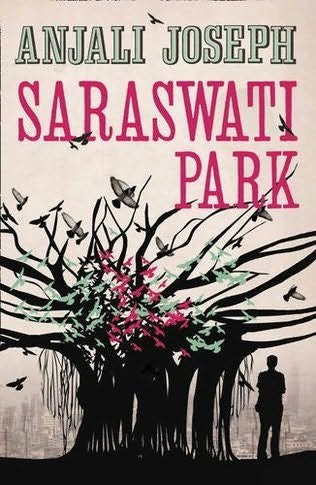On Sale: 10/08/2010; Format: Trade paperback; Publishers: Harper Collins; Fiction (South-Asian)
Mumbai with its chaos, complexities, concrete blocks housing hundreds of people, cosmopolitan population and where the richest of the rich and poorest of the poor live side by side, continues to be a very popular city to write about. Infact, in the last decade or so, there's been a spate of books about the city, "Maximum City" by Suketu Mehta, "Shantaram" by Gregory David Roberts, "Sacred Games" and "Love and Longing in Bombay" by Vikram Chandra...the more recent one to join the list is Anjali Joseph's "Saraswati Park".
Just the title was enough to draw me to this book. Saraswati is the goddess of knowledge and the Arts in Hindu mythology and she has always been my favourite deity. In the book, "Saraswati Park" is the name of a housing complex in a suburb somewhere deep in the heart of Bombay. The story revolves around empty-nesters, Mohan and Laxmi Karekar, whose lives are pretty humdrum and unremarkable. Mohan is a letter writer ( one of those quaint jobs which is almost non-existant today) and from his seat under some tarpaulin near the main Post Office he sits and writes letters for those who are illiterate - anything from heartfelt letters to the completion of bureaucratic forms, while Laxmi is a homemaker.
When we first meet Mohan and Laxmi their days are mundane with set routines and nothing much happens to alter it. Both seem frustrated by this mundane existance. An avid reader, Mohan wishes he could do more than just write letters....his secret desire is to write stories worthy of publication and Laxmi, frustrated by how his dreams make him distant from her turns to the television for company.
I love how Joseph details Laxmi's frustration with their emotional detachment in this nicely-written excerpt:
"Four of Mohan's shirts, collected this morning from the ironing boys, lay on the bed. She looked at them in exasperation. It was still there, the mild ring of dirt inside his collars, like a smudged pencil line. It wasn't his fault; nothing could be done. She had scrubbed at some of them to remove the mark, but it had been the collar, not the stain, that had begun to despair and fray. It was in these things, which didn't talk or, strictly speaking, have lives, that her days played out: her relationship with the shirts, neatly ironed and folded, was so much more direct that any other interaction these days."
One day the couple receive a call from Mohan's sister lamenting the fact that her son Ashish failed his college exams (due to poor attendance) and would have to retake them (unknown to the family, the poor attendance was due to Ashish's dalliance with a fellow classmate called Sundar). Since they (Ashish's parents) were being transferred to a city to the north of India, would it be possible for Ashish to stay with Mohan and Laxmi for the year? Mohan and Laxmi readily agree and soon the focus of the story moves to 19-year old Ashish - his life, his friends, his fears, his relationships, his secrets. Despite there being "secrets" in this novel it has a very calm tone with a quietness and melancholy that emanates like faint perfume from every page, making it linger on with the reader long after the last page has been read and the book closed.
For those of you who grew up in Bombay (mid '80's) this novel will be especially precious because of the author's wonderful observations and descriptions of this wonderful city I call home. The strength of this novel is its everyday observations of a couple approaching their twilight years; of a youngster just starting to find his feet in this world and discovering his sexuality and last, but not least, of a city that is home to atleast 14 million people and who expands (like a rubberband) to accommodate thousands more everyday.
It is also a book about family love and obligations; growing old together, about love and loss and goodbyes. All these may seem like heavy topics but they are handled deftly and delicately by Ms. Joseph and there is none of that masala or twists and turns that we have come to associate with other Bombay novels - just an initmate journey into the lives of everyday people who happen to live rather quietly in this bustling metropolis. As much as I liked the other Bombay novels mentioned above, none of those plots seemed real to me. My Bombay was like the Bombay one finds in Saraswati Park...of trees and birds; ordinary people, school, college, the market, weddings, neighbours, old books, corner shops and so on. This novel is a celebration of everyday life and seeing some beauty in it.
I'd like to close with a beautifully written passage found on page 253. This is when Ashish is getting ready to leave for California for his future studies. This passage resonated so much with me because, I, too, had to bid Bombay farewell around the same age Ashish did and it hurt so much:
"...he felt melancholic; finally he understood what life was like, the meetings and partings it entailed. It was a thought that only made him more attached to his life and the people in it.
From his window seat he looked with hungry eyes at the dirty worlds next to the tracks: the brigtly painted shacks, the grubby faced children, the ugly concrete tower blocks, the smells...

